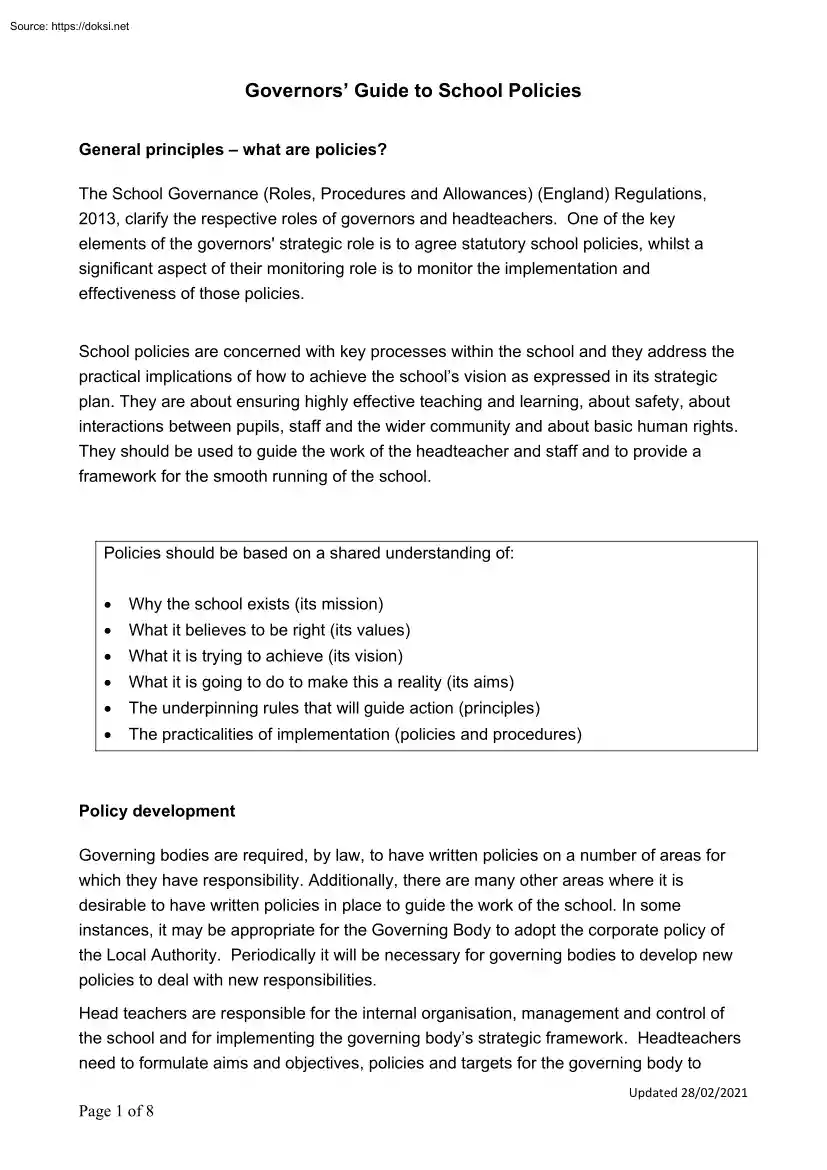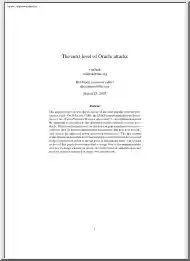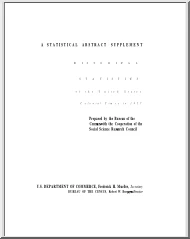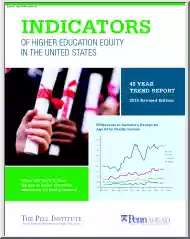Please log in to read this in our online viewer!

Please log in to read this in our online viewer!
No comments yet. You can be the first!
What did others read after this?
Content extract
Governors’ Guide to School Policies General principles – what are policies? The School Governance (Roles, Procedures and Allowances) (England) Regulations, 2013, clarify the respective roles of governors and headteachers. One of the key elements of the governors' strategic role is to agree statutory school policies, whilst a significant aspect of their monitoring role is to monitor the implementation and effectiveness of those policies. School policies are concerned with key processes within the school and they address the practical implications of how to achieve the school’s vision as expressed in its strategic plan. They are about ensuring highly effective teaching and learning, about safety, about interactions between pupils, staff and the wider community and about basic human rights. They should be used to guide the work of the headteacher and staff and to provide a framework for the smooth running of the school. Policies should be based on a shared understanding of:
• Why the school exists (its mission) • What it believes to be right (its values) • What it is trying to achieve (its vision) • What it is going to do to make this a reality (its aims) • The underpinning rules that will guide action (principles) • The practicalities of implementation (policies and procedures) Policy development Governing bodies are required, by law, to have written policies on a number of areas for which they have responsibility. Additionally, there are many other areas where it is desirable to have written policies in place to guide the work of the school. In some instances, it may be appropriate for the Governing Body to adopt the corporate policy of the Local Authority. Periodically it will be necessary for governing bodies to develop new policies to deal with new responsibilities. Head teachers are responsible for the internal organisation, management and control of the school and for implementing the governing body’s strategic framework.
Headteachers need to formulate aims and objectives, policies and targets for the governing body to Page 1 of 8 Updated 28/02/2021 consider adopting. Generally the headteacher and staff will do much of the detailed work on producing policies and will then present their ideas to the governing body for discussion, amendment and approval. Nevertheless, governors can contribute ideas in the early stages of drafting and help to refine the proposals. In particular, governors with specific expertise in an area such as health and safety or personnel might join up with one or two members of staff to form a working party to draw up a policy. Oversight of the production of policies is often delegated to the committees. There is no single correct format for a policy. It can range from a brief statement of principles to including extensive detail about procedures to be followed. To be effective, policies should reflect the unique context of the school. There are no statutory rules on how a
policy should be presented but good practice suggests that a common format, style and font will unify a school’s policies. All policies should incorporate the following sections: • Status – statutory, expected or recommended • Purpose – a brief statement referring to relevant local guidelines, national regulations and the school’s own values, vision and aims. • Consultation – list which groups, individuals and documents were consulted. This is useful when the policy needs revising • Cross-references to other documents – a more coherent approach can be achieved by linking with other policies • Roles and responsibilities of headteacher, staff and governors – the core and most detailed part of the policy • Arrangements for monitoring and evaluation – what evidence would demonstrate success and how and when will it be brought to the attention of the governing body. • Date established by governing body • Date for review • Signature of
Chair of Governors (or Chair of Committee) Implementation, Monitoring and Evaluation of Policies The cycle of policy development, implementation and impact measurement clearly relates to the governing body’s three key roles. Working strategically - governing bodies help to define the school’s values, vision and aims and to establish the policies that provide a framework for the day to day work of the headteacher and staff. They should also contribute to the debate about which additional Page 2 of 8 Updated 28/02/2021 policies the school needs, beyond the statutory ones, to ensure coherence and clarity in the management process. Critical friend - governors monitor and evaluate the implementation and impact of the school’s plans and policies. In order to do this effectively they should have a list of what should be in place, when each policy was ratified and a rolling programme for reviewing the state of those policies over time. Governors should receive evidence from the
headteacher and staff so that they understand how policies are being implemented and the impact they are having. Accountability - reports from the headteacher should enable governors to answer to the school’s stakeholders for the school’s performance. This accountability will be discharged through the school profile and the prospectus. Governors’ responsibilities are exercised further when governing bodies run pupil disciplinary hearings, make decisions on the budget and staff salaries and are involved in staff recruitment and dismissal proceedings. How such issues are addressed on a day to day basis is guided by the school’s policies and procedures. Monitoring is about gathering evidence to show that plans and policies are being implemented, and to check that progress is being made. • What evidence will demonstrate success? • Who will collect it? • How and when will it be collected? • How and when will it be presented to governors? Evaluation uses that evidence
to make a judgement about the impact of the plans and policies on the school’s performance. Rigorous evaluation of the implementation and impact of a policy may lead to changes in practice. Reviewing and Updating Policies Once written, policies need to be revisited regularly because schools, local authorities and national government are dynamic institutions subject to constant change. Governors should have mechanisms in place to regularly review and evaluate existing policies to ensure that they are still relevant in achieving their stated aims and objectives. This review process will often lead to a need to amend existing policies or - in some cases to significantly re-write or produce new policies. Page 3 of 8 Updated 28/02/2021 Some policies will need to be reviewed annually, others may be left for longer. Where governing bodies plan their meetings in advance for the full year ahead it is a straightforward task to ensure that policy reviews are added to agendas for
governing body meetings. The governing body may decide to delegate responsibility for particular policies to committees or individuals. In such cases, providing this is clearly stated in the committee terms of reference, it is not necessary for policies to be approved by a committee and then discussed a second time and ratified by the full governing body. When reviewing policies, the following factors should be considered: • Are policies linked to a clear statement of values? • Is there a consistent approach to the format? • Are all the statutory policies in place? • Where can policies be found? • Would staff, governors and parents know how to access the policies? • Do the policies provide a clear basis for the implementation of rules and procedures? • Do the policies provide positive direction for staff? • When were the policies last reviewed? • How does the governing body know whether the policies are being implemented? • Are the policies
having the desired effect? Page 4 of 8 Updated 28/02/2021 Step-by-step guide to managing your policies • Compile a checklist of all your policies, statutory and non-statutory • Assign responsibility for each policy to the full governing body, a committee or an individual • Ensure that, where responsibility for policies is delegated to a committee, the terms of reference for that committee state clearly that this is the case • Establish the required interval between policy reviews. Be flexible in response to changes in legislation. • Extract and sequence all the review dates and put into place a rolling programme of policy reviews • Assign each policy review to a scheduled meeting of the governing body or one of its committees • Ensure that Governing Body minutes state which policies have been reviewed and show evidence of any discussion regarding policies • Once a policy has been approved, one copy of it must be dated and signed off by the appropriate Chair and a
new review date inserted • A Policies Folder containing the checklist plus signed copies of the most up-to-date version of every policy should be kept in the school office for easy access by staff, parents and Ofsted. • The list of statutory policies should be updated each time a new version of the Guide to the Law is published • New policies should be developed in line with school’s needs and local and national requirements and regulations Page 5 of 8 Updated 28/02/2021 Policies and Documents Status Review Interval Responsibility Accessibility Plan Statutory Every 3 years Finance Committee Admission Arrangements (Aided & Foundation Schools only) Statutory At least every 7 years Management Committee Capability of Staff Policy & Procedures Statutory Every 2 or 3 Management Committee Central Record of Recruitment & Vetting Checks Statutory Ongoing Headteacher Charging & Remissions Policy Statutory Every 2 or 3 years Finance Committee
Complaints Procedure Statutory Every 3 or 4 years Management Committee Data Protection Policy Statutory At least every 2 years Finance Committee Equality Information and Objectives – Statement for Publication Statutory Every 2 or 3 years SI Committee Freedom of Information Publication Scheme Statutory Every 2 or 3 years Management Committee Governors’ Allowances (scheme for paying) Statutory Every 2 or 3 years Finance Committee Health and Safety Policy (including risk assessments) Statutory Every 2 or 3 years Finance Committee Home School Agreement Statutory Every 2 or 3 years SI Committee Instrument of Government Statutory When GB wants to change its size or name Management Committee Premises Management Documents ie fire safety, asbestos etc. Statutory Every 2 or 3 years Finance Committee Register of Business Interests of Head and Governors Statutory Annually Clerk School Behaviour Policy Statutory Every 2 or 3 years SI Committee Sex
Education Policy Statutory Every 2 or 3 years SI Committee Special Educational Needs Policy Statutory Every 2 or 3 years SI Committee Staff Discipline, Conduct and Grievance Statutory Every 2 or 3 years Management Committee Teacher Appraisal Policy Statutory Every 2 or 3 years Management Committee Page 6 of 8 Last Review Next Review Updated 28/02/2021 Teacher’s Pay Policy Statutory Every 2 or 3 years Management Committee Allegations of Abuse Against Staff – Statement of Procedures Expected Every 3 or 4 years Staffing Committee Assessment Policy and Guidelines Expected Every 3 or 4 years SI Committee Attendance Policy Expected Every 3 or 4 years Headteacher Child Protection Policy & Procedures Expected Annually Management Committee Collective Worship Policy Expected Every 3 or 4 years Management Committee Community Cohesion Policy Expected Every 3 or 4 years Management Committee Early Years Foundation Stage Policies &
Procedures Expected Every 3 or 4 years SI Committee Equal Opportunities Policy Expected Every 3 or 4 years Management Committee Finance Policy Expected Every 3 or 4 years Finance Committee Health Education including Drug Education Expected Every 3 or 4 years SI Committee Professional Development Expected Every 3 or 4 years Staffing Committee Review of Staffing Structure Document Expected Annually Staffing Committee Safeguarding Policy Expected Annually Management Committee School Development/Improvement Plan Expected Termly Management Committee Self Evaluation Document Expected Termly Management Committee Whistle Blowing Policy Expected Every 3 or 4 years Staffing Committee Additional Health Needs Policy Recommended Every 3 or 4 years SI Committee Curriculum Policy Recommended Every 3 or 4 years Headteacher Governors’ Induction, Training & Support Recommended Every 2 or 3 years Management Committee Governors’ Visits to School
Guidance Recommended Every 3 or 4 years Management Committee Homework Policy Recommended Every 3 or 4 years SI Committee ICT Policy (including e-safety and acceptable use) Recommended Every 2 or 3 years SI Committee Every 3 or 4 years SI Committee Pastoral Care Policy Page 7 of 8 Recommended Updated 28/02/2021 School Uniform Policy Recommended Every 3 or 4 years SI Committee School Visits/Journeys Recommended Every 3 or 4 years SI Committee Staff Induction Policy Recommended Every 3 or 4 years Staffing Committee Staff Leave of Absence Policy Recommended Every 3 or 4 years Staffing Committee Staff Recruitment and Selection Recommended Every 3 or 4 years Staffing Committee Page 8 of 8 Updated 28/02/2021
• Why the school exists (its mission) • What it believes to be right (its values) • What it is trying to achieve (its vision) • What it is going to do to make this a reality (its aims) • The underpinning rules that will guide action (principles) • The practicalities of implementation (policies and procedures) Policy development Governing bodies are required, by law, to have written policies on a number of areas for which they have responsibility. Additionally, there are many other areas where it is desirable to have written policies in place to guide the work of the school. In some instances, it may be appropriate for the Governing Body to adopt the corporate policy of the Local Authority. Periodically it will be necessary for governing bodies to develop new policies to deal with new responsibilities. Head teachers are responsible for the internal organisation, management and control of the school and for implementing the governing body’s strategic framework.
Headteachers need to formulate aims and objectives, policies and targets for the governing body to Page 1 of 8 Updated 28/02/2021 consider adopting. Generally the headteacher and staff will do much of the detailed work on producing policies and will then present their ideas to the governing body for discussion, amendment and approval. Nevertheless, governors can contribute ideas in the early stages of drafting and help to refine the proposals. In particular, governors with specific expertise in an area such as health and safety or personnel might join up with one or two members of staff to form a working party to draw up a policy. Oversight of the production of policies is often delegated to the committees. There is no single correct format for a policy. It can range from a brief statement of principles to including extensive detail about procedures to be followed. To be effective, policies should reflect the unique context of the school. There are no statutory rules on how a
policy should be presented but good practice suggests that a common format, style and font will unify a school’s policies. All policies should incorporate the following sections: • Status – statutory, expected or recommended • Purpose – a brief statement referring to relevant local guidelines, national regulations and the school’s own values, vision and aims. • Consultation – list which groups, individuals and documents were consulted. This is useful when the policy needs revising • Cross-references to other documents – a more coherent approach can be achieved by linking with other policies • Roles and responsibilities of headteacher, staff and governors – the core and most detailed part of the policy • Arrangements for monitoring and evaluation – what evidence would demonstrate success and how and when will it be brought to the attention of the governing body. • Date established by governing body • Date for review • Signature of
Chair of Governors (or Chair of Committee) Implementation, Monitoring and Evaluation of Policies The cycle of policy development, implementation and impact measurement clearly relates to the governing body’s three key roles. Working strategically - governing bodies help to define the school’s values, vision and aims and to establish the policies that provide a framework for the day to day work of the headteacher and staff. They should also contribute to the debate about which additional Page 2 of 8 Updated 28/02/2021 policies the school needs, beyond the statutory ones, to ensure coherence and clarity in the management process. Critical friend - governors monitor and evaluate the implementation and impact of the school’s plans and policies. In order to do this effectively they should have a list of what should be in place, when each policy was ratified and a rolling programme for reviewing the state of those policies over time. Governors should receive evidence from the
headteacher and staff so that they understand how policies are being implemented and the impact they are having. Accountability - reports from the headteacher should enable governors to answer to the school’s stakeholders for the school’s performance. This accountability will be discharged through the school profile and the prospectus. Governors’ responsibilities are exercised further when governing bodies run pupil disciplinary hearings, make decisions on the budget and staff salaries and are involved in staff recruitment and dismissal proceedings. How such issues are addressed on a day to day basis is guided by the school’s policies and procedures. Monitoring is about gathering evidence to show that plans and policies are being implemented, and to check that progress is being made. • What evidence will demonstrate success? • Who will collect it? • How and when will it be collected? • How and when will it be presented to governors? Evaluation uses that evidence
to make a judgement about the impact of the plans and policies on the school’s performance. Rigorous evaluation of the implementation and impact of a policy may lead to changes in practice. Reviewing and Updating Policies Once written, policies need to be revisited regularly because schools, local authorities and national government are dynamic institutions subject to constant change. Governors should have mechanisms in place to regularly review and evaluate existing policies to ensure that they are still relevant in achieving their stated aims and objectives. This review process will often lead to a need to amend existing policies or - in some cases to significantly re-write or produce new policies. Page 3 of 8 Updated 28/02/2021 Some policies will need to be reviewed annually, others may be left for longer. Where governing bodies plan their meetings in advance for the full year ahead it is a straightforward task to ensure that policy reviews are added to agendas for
governing body meetings. The governing body may decide to delegate responsibility for particular policies to committees or individuals. In such cases, providing this is clearly stated in the committee terms of reference, it is not necessary for policies to be approved by a committee and then discussed a second time and ratified by the full governing body. When reviewing policies, the following factors should be considered: • Are policies linked to a clear statement of values? • Is there a consistent approach to the format? • Are all the statutory policies in place? • Where can policies be found? • Would staff, governors and parents know how to access the policies? • Do the policies provide a clear basis for the implementation of rules and procedures? • Do the policies provide positive direction for staff? • When were the policies last reviewed? • How does the governing body know whether the policies are being implemented? • Are the policies
having the desired effect? Page 4 of 8 Updated 28/02/2021 Step-by-step guide to managing your policies • Compile a checklist of all your policies, statutory and non-statutory • Assign responsibility for each policy to the full governing body, a committee or an individual • Ensure that, where responsibility for policies is delegated to a committee, the terms of reference for that committee state clearly that this is the case • Establish the required interval between policy reviews. Be flexible in response to changes in legislation. • Extract and sequence all the review dates and put into place a rolling programme of policy reviews • Assign each policy review to a scheduled meeting of the governing body or one of its committees • Ensure that Governing Body minutes state which policies have been reviewed and show evidence of any discussion regarding policies • Once a policy has been approved, one copy of it must be dated and signed off by the appropriate Chair and a
new review date inserted • A Policies Folder containing the checklist plus signed copies of the most up-to-date version of every policy should be kept in the school office for easy access by staff, parents and Ofsted. • The list of statutory policies should be updated each time a new version of the Guide to the Law is published • New policies should be developed in line with school’s needs and local and national requirements and regulations Page 5 of 8 Updated 28/02/2021 Policies and Documents Status Review Interval Responsibility Accessibility Plan Statutory Every 3 years Finance Committee Admission Arrangements (Aided & Foundation Schools only) Statutory At least every 7 years Management Committee Capability of Staff Policy & Procedures Statutory Every 2 or 3 Management Committee Central Record of Recruitment & Vetting Checks Statutory Ongoing Headteacher Charging & Remissions Policy Statutory Every 2 or 3 years Finance Committee
Complaints Procedure Statutory Every 3 or 4 years Management Committee Data Protection Policy Statutory At least every 2 years Finance Committee Equality Information and Objectives – Statement for Publication Statutory Every 2 or 3 years SI Committee Freedom of Information Publication Scheme Statutory Every 2 or 3 years Management Committee Governors’ Allowances (scheme for paying) Statutory Every 2 or 3 years Finance Committee Health and Safety Policy (including risk assessments) Statutory Every 2 or 3 years Finance Committee Home School Agreement Statutory Every 2 or 3 years SI Committee Instrument of Government Statutory When GB wants to change its size or name Management Committee Premises Management Documents ie fire safety, asbestos etc. Statutory Every 2 or 3 years Finance Committee Register of Business Interests of Head and Governors Statutory Annually Clerk School Behaviour Policy Statutory Every 2 or 3 years SI Committee Sex
Education Policy Statutory Every 2 or 3 years SI Committee Special Educational Needs Policy Statutory Every 2 or 3 years SI Committee Staff Discipline, Conduct and Grievance Statutory Every 2 or 3 years Management Committee Teacher Appraisal Policy Statutory Every 2 or 3 years Management Committee Page 6 of 8 Last Review Next Review Updated 28/02/2021 Teacher’s Pay Policy Statutory Every 2 or 3 years Management Committee Allegations of Abuse Against Staff – Statement of Procedures Expected Every 3 or 4 years Staffing Committee Assessment Policy and Guidelines Expected Every 3 or 4 years SI Committee Attendance Policy Expected Every 3 or 4 years Headteacher Child Protection Policy & Procedures Expected Annually Management Committee Collective Worship Policy Expected Every 3 or 4 years Management Committee Community Cohesion Policy Expected Every 3 or 4 years Management Committee Early Years Foundation Stage Policies &
Procedures Expected Every 3 or 4 years SI Committee Equal Opportunities Policy Expected Every 3 or 4 years Management Committee Finance Policy Expected Every 3 or 4 years Finance Committee Health Education including Drug Education Expected Every 3 or 4 years SI Committee Professional Development Expected Every 3 or 4 years Staffing Committee Review of Staffing Structure Document Expected Annually Staffing Committee Safeguarding Policy Expected Annually Management Committee School Development/Improvement Plan Expected Termly Management Committee Self Evaluation Document Expected Termly Management Committee Whistle Blowing Policy Expected Every 3 or 4 years Staffing Committee Additional Health Needs Policy Recommended Every 3 or 4 years SI Committee Curriculum Policy Recommended Every 3 or 4 years Headteacher Governors’ Induction, Training & Support Recommended Every 2 or 3 years Management Committee Governors’ Visits to School
Guidance Recommended Every 3 or 4 years Management Committee Homework Policy Recommended Every 3 or 4 years SI Committee ICT Policy (including e-safety and acceptable use) Recommended Every 2 or 3 years SI Committee Every 3 or 4 years SI Committee Pastoral Care Policy Page 7 of 8 Recommended Updated 28/02/2021 School Uniform Policy Recommended Every 3 or 4 years SI Committee School Visits/Journeys Recommended Every 3 or 4 years SI Committee Staff Induction Policy Recommended Every 3 or 4 years Staffing Committee Staff Leave of Absence Policy Recommended Every 3 or 4 years Staffing Committee Staff Recruitment and Selection Recommended Every 3 or 4 years Staffing Committee Page 8 of 8 Updated 28/02/2021




 When reading, most of us just let a story wash over us, getting lost in the world of the book rather than paying attention to the individual elements of the plot or writing. However, in English class, our teachers ask us to look at the mechanics of the writing.
When reading, most of us just let a story wash over us, getting lost in the world of the book rather than paying attention to the individual elements of the plot or writing. However, in English class, our teachers ask us to look at the mechanics of the writing.